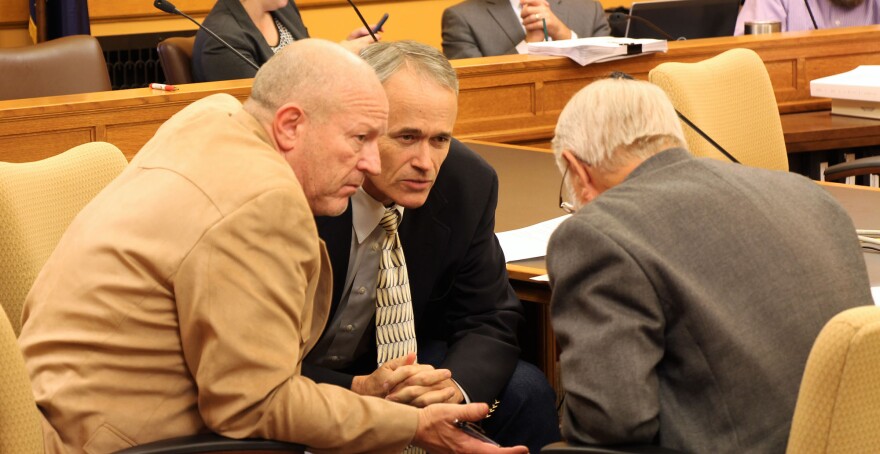The Kansas House is expected Monday morning to debate a mega bill that ties sweeping tax reforms and higher funding for public schools into a single yes-or-no vote.
The latest attempt at sealing elusive deals on income tax and school finance emerged Sunday afternoon following three days of stop-and-go negotiations between the Legislature’s two chambers, which each have passed their own versions of a K-12 bill.
Now lawmakers will vote simultaneously on whether to increase state aid for schools by about $280 million — and scuttle Gov. Sam Brownback’s signature tax policies.
Any school finance or tax deal, or combination thereof, will need two-thirds majorities in the House and Senate should Brownback choose to block it. The governor vetoed an attempt in February to roll back his tax cuts, and an override attempt fell short in the Senate.
After agreeing Sunday to fold tax reforms into the school finance bill, Senate Majority Leader Jim Denning said that the proposal, which came from House leadership, aims to make the package less susceptible to Brownback’s opposition.
“We’re hoping that this will give him another reason not to veto,” Denning said.
Not everyone is convinced. Senate Minority Leader Anthony Hensley panned the proposal.
He predicted the Kansas Supreme Court would find it unconstitutional because it doesn’t increase K-12 aid sufficiently.
“The second thing this bill does not do,” he added, “it doesn’t raise enough revenue in order to not only fund our school finance plan, but to fund a sustainable budget into the foreseeable future.”
The income tax portions of the bill would raise tax revenue more than $1 billion over the next two fiscal years. Kansas is facing a projected deficit of $900 million for that same period.
The provisions would end a mechanism designed to push income taxes toward zero and delete an exemption for owners of more than 300,000 businesses that has been the focus of political backlash in recent years.
In tax year 2018, married taxpayers filing jointly would pay 3 percent if earning up to $30,000, 5.25 percent for those up to $100,000 and 5.6 percent for earners above that.
By comparison, under current law the lowest tier would be 2.6 percent in 2018, and married earners filing jointly at more than $30,000 would pay 4.6 percent.
In addition to pursuing tax reform, the Legislature is writing a new school finance formula this year and is under pressure to increase aid. In March the Kansas Supreme Court found state aid to be inadequate and set a June 30 deadline for fixing that.
Denning said tying taxes and school funding into a single bill could help the state’s case in this ongoing litigation because the combined legislation dedicates income tax receipts for funding schools.
“The Supreme Court said they wanted a very consistent revenue stream,” he said. “That’s about as consistent as we could deliver them.”
Separately, the bill would expand a school choice program that funds scholarships for children from low-income families to attend private schools instead of their local public option.
The private school program works by giving corporations tax credits worth 70 percent of their donations to such scholarships. Under this bill, individuals also would be able to donate and receive tax credits.
Kansas legislative sessions normally last 90 days, but in anticipation of this year’s contentious policy and spending decisions, lawmakers scheduled 100 days. Sunday marked the Legislature’s 107th day.
Celia Llopis-Jepsen is a reporter for the Kansas News Service, a collaboration of KCUR, Kansas Public Radio and KMUW covering health, education and politics. You can reach her on Twitter @Celia_LJ. Kansas News Service stories and photos may be republished at no cost with proper attribution and a link back to kcur.org.





